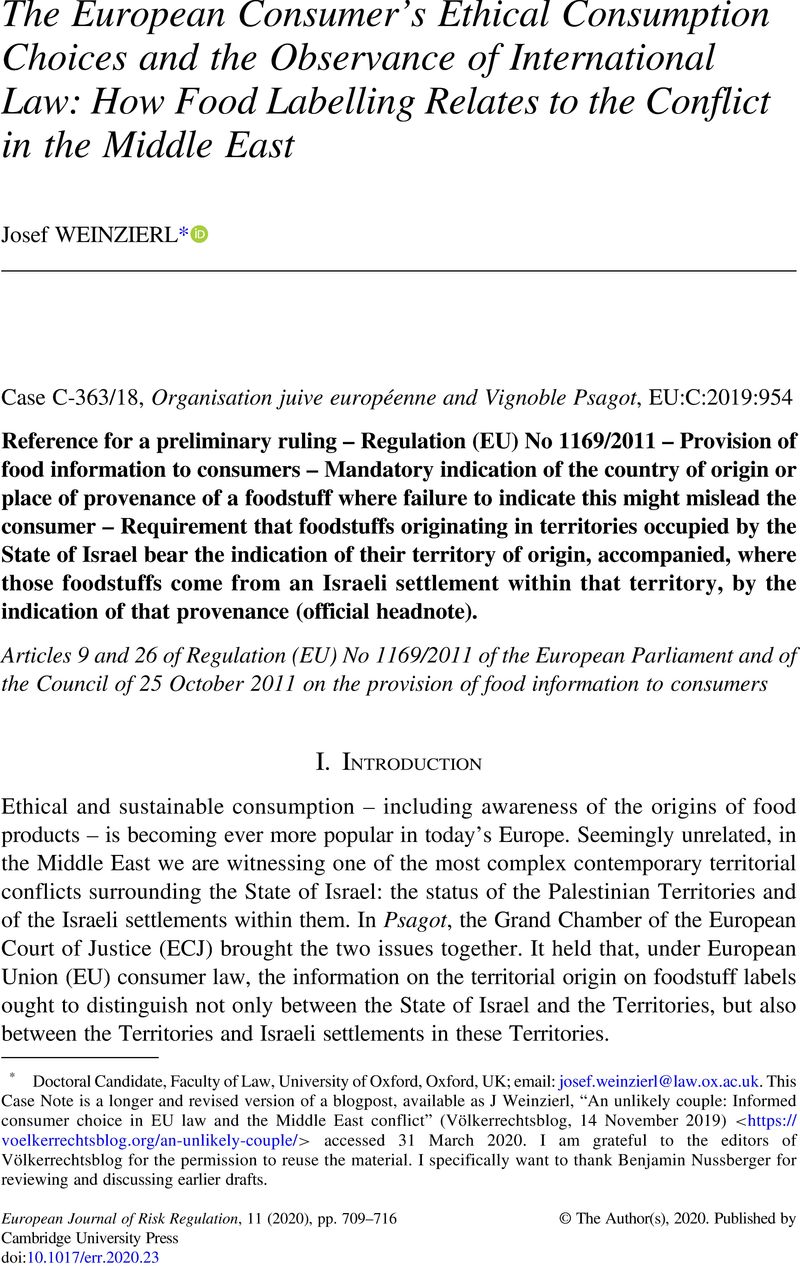Published online by Cambridge University Press: 16 June 2020

This Case Note is a longer and revised version of a blogpost, available as J Weinzierl, “An unlikely couple: Informed consumer choice in EU law and the Middle East conflict” (Völkerrechtsblog, 14 November 2019) <https://voelkerrechtsblog.org/an-unlikely-couple/> accessed 31 March 2020. I am grateful to the editors of Völkerrechtsblog for the permission to reuse the material. I specifically want to thank Benjamin Nussberger for reviewing and discussing earlier drafts.
1 Commission, Interpretative Notice on indication of origin of goods from the Territories occupied by Israel since June 1967 [2015] OJ C 375/4.
2 Given the nature of the proceedings (preliminary reference), criticism according to which the Court should have addressed questions of international law related to other territories is misguided. But see O Kanevskaia, “Misinterpreting Mislabelling: The Psagot Ruling” (2019) 4(3) European Papers 763, 776.
3 Art 60 para 1 Union Customs Code reads: “Goods wholly obtained in a single country or territory shall be regarded as having their origin in that country or territory”.
4 See Case C-363/18 Organisation juive européenne and Vignoble Psagot EU:C:2019:954, paras 27–35 (Psagot).
5 For definition, see ibid, para 41: “In view of these elements, the concept of ‘place of provenance’ must be understood as referring to any specific geographical area within the country or territory of origin of a foodstuff, with the exception of a producer’s address”.
6 As AG Hogan notes, the Court has already recognised this distinction in Case C-386/08 Brita EU:C:2010:91. See Case C-363/18 Organisation juive européenne and Vignoble Psagot EU:C:2019:494, Opinion of AG Hogan, para 56.
7 Psagot, supra, note 4, paras 44–45.
8 ibid, para 53, referring to Art 3(1) and Recitals 3 and 4 of Regulation 1169/2011.
9 ibid, para 48.
10 ibid, paras 56–57.
11 Mike Pompeo (SecPompeo), Tweet (13 November 2019, 8.17 pm): “The CJEU’s decision yesterday serves only to encourage, facilitate, and promote [Boycott, Divestment and Sanctions (BDS)] against Israel. The United States unequivocally opposes any effort to engage in BDS. The path toward resolving the Israeli-Palestinian conflict is through direct negotiations”.
12 M Polzin, “Außenpolitik statt Verfassungsschutz” (Verfassungsblog, 19 November 2019) <https://verfassungsblog.de/aussenpolitik-statt-verbraucherschutz/#comments> accessed 31 March 2020: “Man kommt nicht umhin, hier an die Parole der Nationalsozialisten ‘Kauft nicht bei Juden’ zu denken”. But see the reaction of O Hardan, “Völkerrecht und Verbraucherschutz: Zur Kennzeichnungspflicht von Lebensmitteln aus israelischen Siedlungen” (Verfassungsblog, 21 November 2019) < https://verfassungsblog.de/voelkerrecht-und-verbraucherschutz/> accessed 31 March 2020.
13 J Kokott and C Sobotta, “Protection of Fundamental Rights in the European Union: On the Relationship between EU Fundamental Rights, the European Convention and National Standards of Protection” (2015) 34 Yearbook of European Law 60, 66.
14 Case C-402/05 P Kadi and Al Barakaat International Foundation v Council and Commission EU:C:2008:461, para 286.
15 Compare Psagot, supra, note 4, paras 30 and 33.
16 ibid, para 31. For more detail on how Psagot relates to the jurisprudence on Occupied Territories, see S Hummelbrunner, “Contextualisation of Psagot in Light of other CJEU Case Law on Occupied Territories” (2019) 4(3) European Papers 779.
17 According to media reports, Luxembourg’s foreign minister Jean Asselborn wants the question back on the agenda of the Foreign Affairs Council. Note that the question of statehood is one of international law. Only the element of recognition seems overtly political.
18 AG Hogan, supra, note 6, section II.
19 Case C-457/18 Slovenia v Croatia EU:C:2020:65. See also Art 77(4) TFEU.
20 Psagot, supra, note 4, para 48, and the reference to International Court of Justice, Advisory Opinion, Legal Consequences of the Construction of a Wall in the Occupied Palestinian Territory ICJ Reports 2004/136, para 120. Undoubtedly due to the political salience of the question, the Israeli Supreme Court has so far avoided ruling on the question. See D Kretzmer, “Settlements in the Supreme Court of Israel” (2017) 111 American Journal of International Law Unbound 41.
21 Psagot, supra, note 4, para 56.
22 See also AG Hogan, supra, note 6, para 51.
23 In more detail, see S Weatherill, EU Consumer Law and Policy (Cheltenham, 2nd edn, Edward Elgar 2013) ch 4.
24 But cf. the criticism at Kanevskaia, supra, note 2, 772.
25 Similarly, C Ryngaert, “Indications of Settlement Provenance and the Duty of Non-Recognition under International Law” (2019) 4(3) European Papers 791, 795.
26 Psagot, supra, note 4, para 54 (emphasis added).
27 ibid, para 56.
28 See also AG Hogan, supra, note 6, paras 50 et sqq.
29 For Kanevskaia, supra, note 2, 774–75, this overstretches the notion “ethical”.